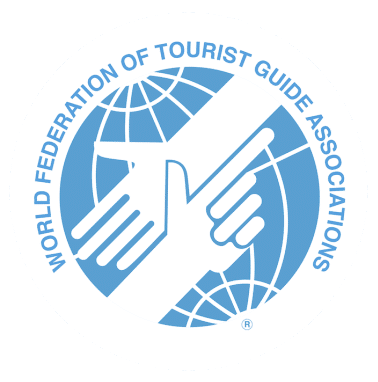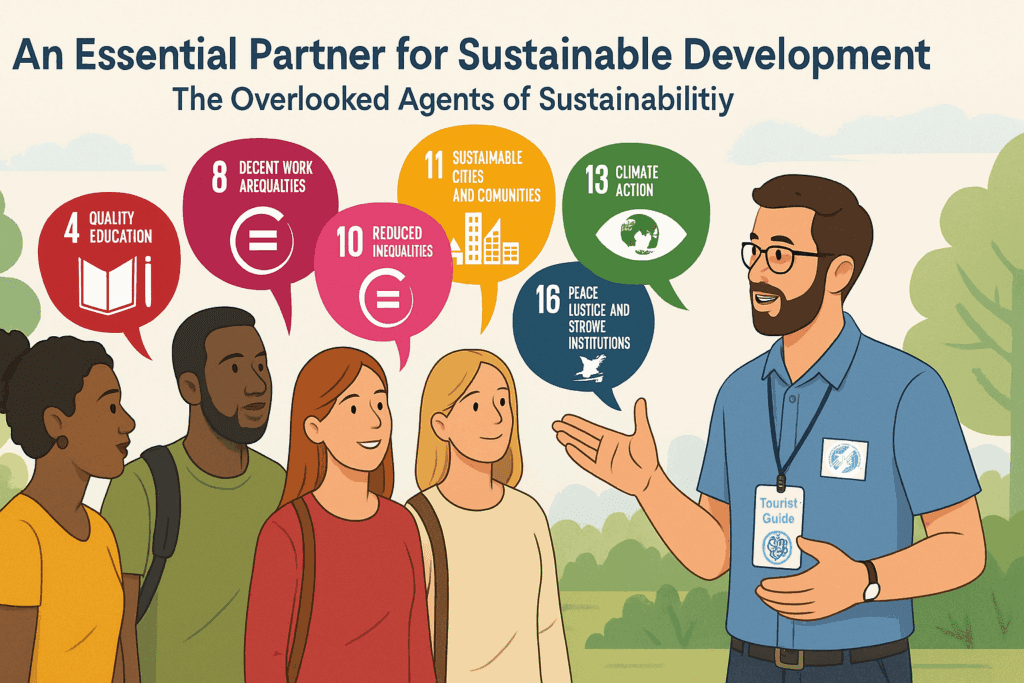An Essential Partner for Sustainable Development
The Overlooked Agents of Sustainability
Whilst the world grapples with the triple challenges of climate change, global inequality, and cultural polarisation, there exists a professional group working daily at the frontlines of human connection and sustainable change: Tourist Guides. They are the invisible architects of cultural exchange and the forgotten catalysts of the UN Sustainable Development Goals (SDGs).
The problem? Tourist Guides are systematically overlooked.
More than Storytellers: The True Power of Tourist Guides
Tourist Guides are not merely interpreters of landscapes or history. They are field educators, dialogue facilitators, and cultural ambassadors. As often the sole point of meaningful human encounter during a visitor’s journey, they bear a unique responsibility—and opportunity—to contribute meaningfully to the UN Sustainable Development Goals.
Their impact is measurable and transformative:
SDG 4 – Quality Education
Tourist Guides deliver contextualised, balanced knowledge in the field. They help travellers move beyond clichés and encourage critical thinking. Their continuous professional development ensures credible knowledge transmission.
SDG 8 – Decent Work and Economic Growth
They combat exploitative models such as unpaid “free tours” and champion local businesses. Through their work, economic value remains within host communities.
SDG 10 – Reduced Inequalities
Guides actively combat discrimination and create inclusive experiences for all—regardless of background, faith, or physical limitations.
SDG 11 – Sustainable Cities and Communities
They protect cultural heritage through visitor management, promote decentralised tourism models, and alleviate pressure on overcrowded attractions.
SDG 12 – Responsible Consumption and Production
Guides educate visitors about the impact of their choices—from souvenirs to transport. They are living agents of responsible consumption.
SDG 13 – Climate Action
They embody environmental stewardship: promoting walking and public transport, minimising waste, and explaining local climate challenges.
SDG 16 – Peace, Justice and Strong Institutions
Guides tell complex stories with dignity and balance. They discuss difficult subjects—war, colonialism, injustice—with context and sensitivity.
The Paradox: Maximum Impact, Minimum Recognition
Despite their enormous potential, Tourist Guides are systematically excluded from sustainability initiatives. Why?
- Lack of lobbying power: They often work as sole traders without strong institutional representation
- Invisible work: Their impact unfolds away from major tourism structures
- Underestimated expertise: Their knowledge of visitor behaviour, site pressures, and community feedback is ignored
This is a critical error. Guides possess intimate knowledge of:
- Traveller motivations and behaviour
- Local challenges and potential
- Cultural sensitivities
- Practical feasibility of sustainability measures
A Call for Partnership
- To Journalists:
Tourist Guides are authentic voices from the ground. They provide unfiltered insights into tourism realities and can communicate complex sustainability themes accessibly. - To NGOs:
Guides are ideal local partners for implementation and awareness-raising. They have direct access to target audiences and enjoy trust. - To Training Institutes:
Professionalising Tourist Guides is key to more sustainable tourism. Joint certification programmes can scale impact. - To Politicians and Decision-makers:
Include guides in planning, implementation, and evaluation processes. Their field expertise is irreplaceable.
The World Federation of Tourist Guide Associations (WFTGA): Your Partner for Change
The WFTGA represents over 80 countries and stands ready as:
- Research partner for studies and consultations
- Keynote speakers and expert panel participants
- Local implementation partners for sustainability initiatives
- Educational partners for capacity-building and training
Concrete WFTGA initiatives:
- Development of a Sustainability Certificate Course for Tourist Guides
- Updated Code of Guiding Practice with SDG focus
- International Convention 2026 in Japan under the banner “Sustainable Tourism”
- Global advocacy for fair working conditions and professionalisation
The Turning Point is Now
Tourism faces a paradigm shift. Sustainability is no longer optional—it is essential for survival. Tourist Guides are ready to lead this transformation. They simply need partners who recognise and utilise their expertise.
“Every day, Tourist Guides stand at the intersection of global mobility and local identity. We are not just witnesses to the world’s most pressing challenges—we are active agents of change. When we guide a group through a historic quarter, we’re not just sharing stories; we’re shaping perspectives on heritage preservation. When we explain local customs, we’re building bridges across cultures. When we recommend sustainable choices, we’re creating ripples of environmental consciousness that travel far beyond our destinations. The SDGs are not abstract goals for us—they are the daily fabric of our professional reality. It’s time the world recognises Tourist Guides not as service providers, but as sustainability leaders.” Sebastian Frankenberger, President, World Federation of Tourist Guide Associations
The question is not whether Tourist Guides can contribute.
The question is whether we are wise enough to ask them.

